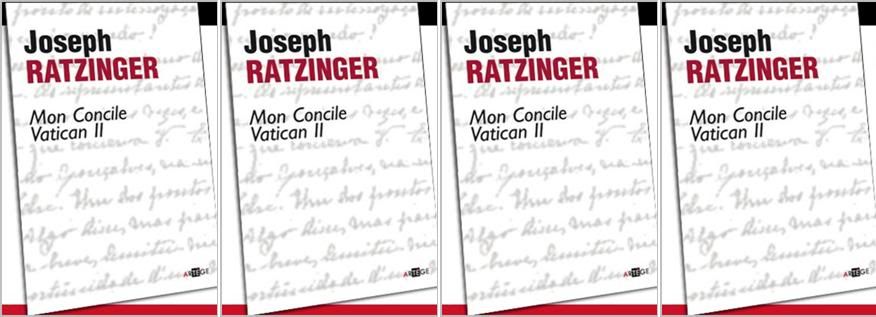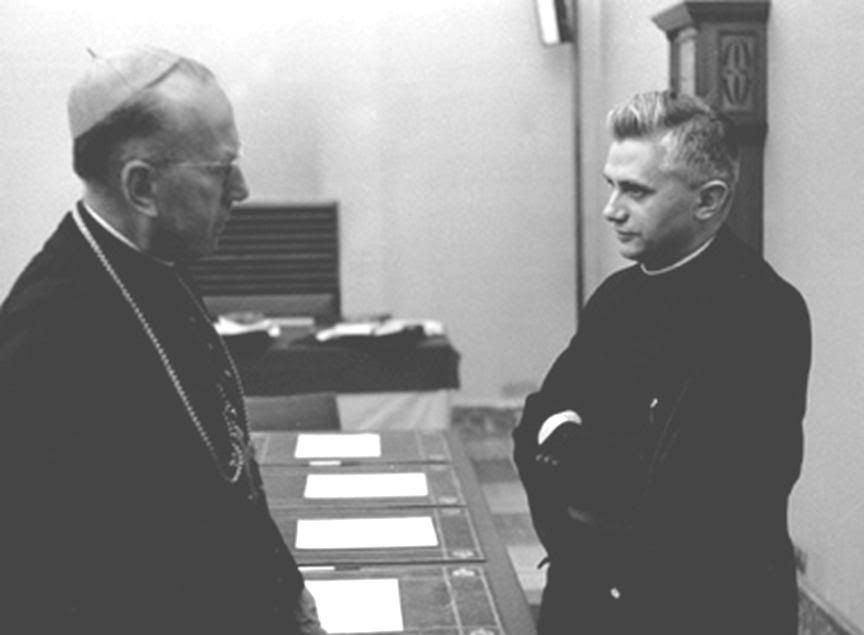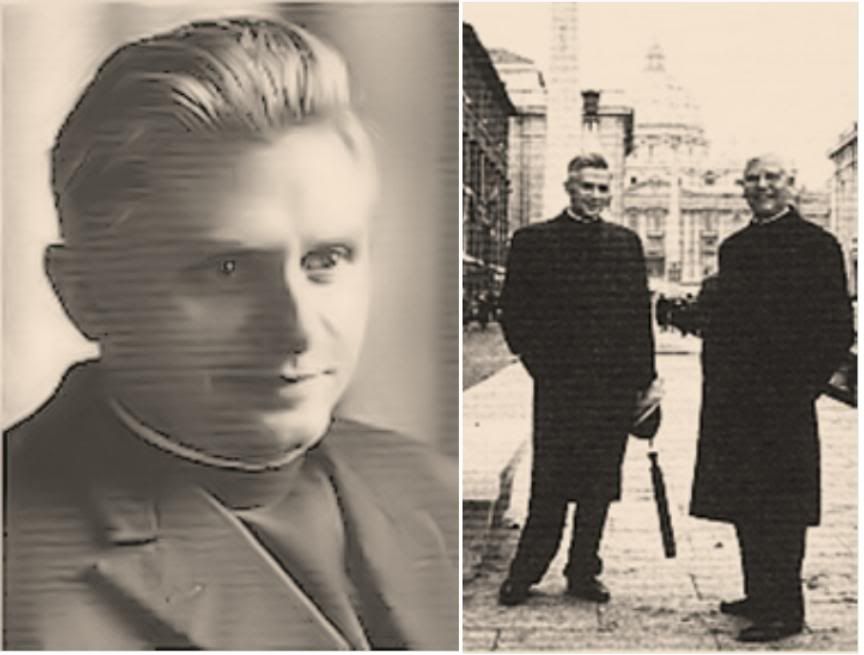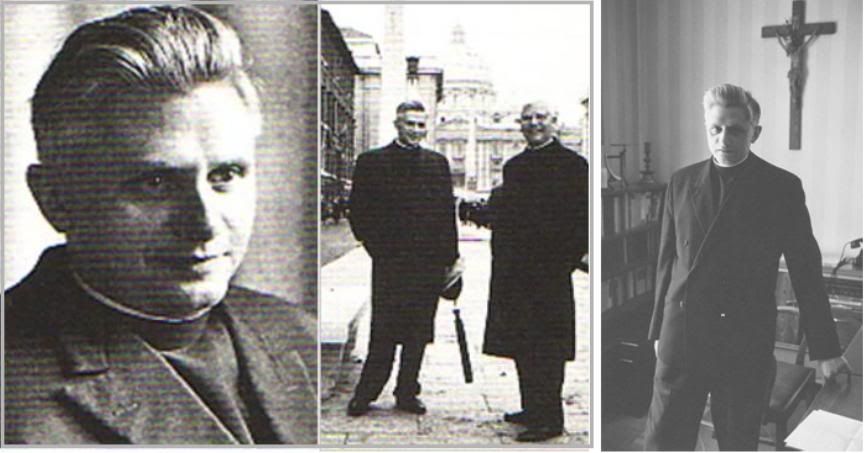
 In December 2005, to open a thread called IN HIS OWN WORDS in the PRF, on articles and interview with Cardinal Ratzinger before he became Pope, my first post was a translation of excerpts from an interview with Cardinal Ratzinger published by La Repubblica published on May 13, 2005, to mark the 40th anniversary of the end of the Council in 1965. In turn, Repubblica had taken the excerpts from the transcript of an interview done by Pasquale Chessa and Francesco Villari for the Archivio delle Memorie project of RAI, the Italian state broadcasting agency [no information when they did the interview), which was published in the Italian magazine RESET. I have since been unable to find anything about it by Googling RESET or RAI.
In December 2005, to open a thread called IN HIS OWN WORDS in the PRF, on articles and interview with Cardinal Ratzinger before he became Pope, my first post was a translation of excerpts from an interview with Cardinal Ratzinger published by La Repubblica published on May 13, 2005, to mark the 40th anniversary of the end of the Council in 1965. In turn, Repubblica had taken the excerpts from the transcript of an interview done by Pasquale Chessa and Francesco Villari for the Archivio delle Memorie project of RAI, the Italian state broadcasting agency [no information when they did the interview), which was published in the Italian magazine RESET. I have since been unable to find anything about it by Googling RESET or RAI.
Much later, in February 2008, Gemma posted the full excerpts printed by Repubblica on Lella's blog, and I translated the entire thing on Page 3 of IN HIS OWN WORDS freeforumzone.leonardo.it/discussione.aspx?idd=354533&p=3
I thought about this last week when I posted the excerpts by the French magazine LA VIE from a new book called MON CONCILE VATICAN, which assembles various writings by Prof. Joseph Ratzinger in 1962-1967 about the Council (Page 194 of this thread), but did not re-post it. It very much deserves a re-post - after all, this is another forum - as the Italian account is a more intimate account, whereas the excerpts from the French book are more 'substantial' ...
My experience of Vatican II
by Cardinal Joseph Ratzinger
Translated from


At the time of the Vatican Council, I was a young professor at the University of Bonn. The Archbishop who had jurisdiction over this university was Cardinal Frings of Cologne. I had given a lecture on the theology of the Council which the Cardinal attended; he appreciated it and invited me to join him in the Council.
Before that, he had already asked me to prepare an address for him to deliver in Genoa, at the invitation of Cardinal Siri, about the problems to be dealt with in the Council.
Apparently, Pope John XXIII liked the address very much - it might have been considered not exactly revolutionary but rather audacious – and embracing Frings, he had told him, “
These were precisely my intentions in calling the Council.” [Take note, 'spiritists'. No less than John XXIII gave the imprimatur to Joseph Ratzinger's pre-Council hermeneutic!]
To see the Church alive in the Council, with 3000 bishops present, was truly an exceptional event: rarely in history could one see the Church in that way, to grasp its universality, at a time of a grand new realization of its mission.
Living in Rome
Along with the Cardinal, I lived in the Collegio dell’Anima on Via della Pace – it was an Austrian institution with a very pleasant atmosphere.
Cardinal Frings gathered all the German-speaking bishops at the College and assigned me to give an overview of the Council agenda to the German episcopate.
I was 32 years old and had just started to teach at University, so for me it was a daunting thing, a heavy charge to take on. In effect, the responsibility for charting the course which the German bishops were to follow during the Council fell on my shoulders.
On the one hand, I felt great joy that I was really taking part in the work of the Council, and on the other hand, I felt the weight of my responsibility to God and to history.
The Council was a historic event, even for me personally. I found myself thrown together with so many persons I had only known before through books.
For a young professor who until then had only known the academic world, even simply taking part in Roman life was a completely new reality. To go out for coffee and get to know Roman life – so different from the life I knew at university – left me with many impressions that have marked my life.
The death of John XXIII
And then, Pope John XXIII died. I remember the great sorrow that was felt even in Germany.
My country is usually not known to be close to Popes, but this time, the whole country suffered for the dying Pope who was very much loved.
It was incredible to see how this man had been able to unite everyone in extraordinary love for him, drawing everyone closer to the Papacy.
Then of course, there was the matter of the succession. As an academic, I had no role in the Conclave. Cardinal Frings and I did not even talk about it.
But we all thought that the Archbishop of Milan (Giovanni Battista Montini) should be the next Pope – he became prominent when he was deputy Secretary of State at the Vatican, so that even in 1958, when Pope Pius XII died, the consensus had been, “Too bad Montini is not yet a Cardinal, he deserves to be Pope one day.”
So it was no surprise when we learned that this time, Archbishop Montini had in fact been elected Pope. For us, it meant a guarantee of continuity for the Council in the spirit of Pope John, who himself had let it be known that he wished the Archbishop of Milan to succeed him. The new Pope was welcomed as a bearer of hope.
The two Popes
So the Council was a basic experience, even for marking the transition between two Popes, who shared the same fundamental intentions although with completely different personalities.
Roncalli and Montini – alike and yet so different.
It was interesting to have seen Pope John, totally charismatic, who lived in the inspiration of the moment and intimacy with the public, while on the other hand, Pope Paul was an intellectual who reflected on everything with incredible seriousness.
In the case of Montini, I remember, for example, the time when there was a difficult point to make in the Constitution on Revelation - there was resistance to giving the appropriate space to Tradition, which was a very important point.
Pope Paul, with great sensitivity and respect for the bishops and for the theologians, on one hand, but also
conscious of his responsibility as guarantor of Tradition, gave us, I think, 18 versions, 18 different ways of how we might treat the point in question, allowing maximum freedom but also safeguarding important doctrinal points.
His sensitivity was, for me, the image of his personality:
his consideration for others, respecting collegiality and freedom, but at the same time, maintaining his responsibility for continuity in the life of the Church. He was punctilious in everything he did.
And no, during the Council, I never once met the Archbishop of Cracow [Karol Wojtyla, who, like Ratzinger, had attended all four sessions of Vatican-II, but as a Council Father, since he was already an archbishop. In fact, they met each other for the first time only much later, in the pre-Conclave days after Pope Paul’s death in 1978.]
Encounter with other theologians
As a consultant, I sat in the section assigned to us, and I was therefore able to follow the Council. In the first two months of the Council, I was not an official 'expert' (peritus), just the Cardinal’s private consultant. In November, I was named an official 'expert' by the Pope and from that moment, I participated officially in all the sessions.
Initially, I could participate in all the work behind the scenes, but not regularly at all the sessions. In these circumstances, it was a great thing for me to see all the experts, great personalities whom I had known through studying their books: Henri De Lubac, Jean Danielou (1905-1974), Yves Congar (1904-1995), Marie-Dominique Chenu (1895-1990) and other big names.
It was extraordinary to meet all these venerated figures because they were persons I admired. It was similarly a great thing to see the representatives from other Churches and Christian confessions. And then, of course, the Pope himself (John XXIII).
I had (first) seen him at Easter, during an audience at St. Peter's, during which he spoke of questions like "What is meditation?", "What is prayer?" - and he developed his answers with Patristic quotations which showed that he was a man of profound theological culture, but at the same time, a man who spoke for the simple people and made himself understood by them.
With the official position I now had, it was an even greater event to be a witness to historic moments. But one thing that remains unforgettable for me was that famous night of the torchlight procession under the moon, when the Pope told the mothers present: “Kiss your children tonight and tell them the kiss comes from the Pope.”
And all this was for me an experience that was doubly new because I was unfamiliar with Roman life....
Salvation for all?
Not just inter-religious dialog, which was not yet very much in sight, but the problem of salvation for non-Christians was very deeply felt. Because non-Christians were not confined to Asia or Africa, but our own society was starting to feel the weight of non-believers, of non-Christians. If there was salvation even outside the Church, then what was the function of the Church in the world?
Another sector that concerned us was exegesis and the reading of
Sacred Scripture. What was desired was a Christianity that would once again be directly nourished by Scripture, but also a greater freedom for the scientific interpretation of it.
To better understand what revelation is, why it is both Scripture and Tradition - these issues were at the center of the dialog with the Protestants.
In Germany, the general problem was that of emerging from a certain closedness of the Catholic world, to open it up to communion with others. At the time, it was, above all, a French problem, whereas the dominant issue for the American bishops was religious freedom.
Rediscovering the weight
of the 'world' in theology
At the time of the Council, I was a typical German universitarian. We did theology but we also took note of the political world and global problems, of Kennedy, Khrushchev, etc. Even so, these were two different worlds, and in the German manner, we did not want to mix political problems with our scientific work.
Only during the Council did we appreciate how all the problems of the world enter into the work of theology: that dialog with the major world views, even the anti-Christian, like Communism, is nevertheless constitutive for true theological work; that one must defend not only the possibility of being Christian, but also demonstrate that this is the best choice, and therefore, enter into a true confrontation with the views of others; and to integrate the problems of anti-Christian world views into our theological work - this, for me, was a lesson to learn.
Relations with the Jews
As I said, the problem of other religions at the time of the Council was not yet very actual in Germany. For us, the problem was the salvation of everyone. And yet, we had to dialog with the Jews, clarify our relations with them, above all, the events of Nazism and resistance to Christianity, which were still actual.
To re-establish relationships with the Jewish world was, for us, a priority, from the beginning. A new reading of the Old Testament had begun: We share with the Jews the greater part of the Bible, therefore the foundations of our faith, because the New Testament always refers back to the Old and cannot be read without it. In addition, friendly conversations had been started with Jews representing various currents of Judaism.
The priority, then was to re-establish a new relationship with the Jewish people: on the one hand, to express our friendship but even our regret for the negative facts in 2000 years of history; and on the other hand, without offending the Jews, to affirm our Christian identity.
…And relations with Islam
and other world religions
The Arab bishops were not against a document about the Jews but they also pointed out: “If you wish to speak about renewing relations with the Jews, do so, but in that case, you also need to speak to the Islamic world”.
At that point, we said to ourselves, “If we must talk about Islam, then let us talk of the other major religions as well”. We had to consider the problem more deeply: What are the religions of the world? Are there existing typologies for them? What is their theological and human impact? How do we relate to these religions now?
Thus, the document that was to become
Nostra aetate widened as we confronted concrete situations of dialog with other religions. At that time, however, the document was considered rather secondary, whereas now we see it as one of the fundamental documents of Vatican II, which has opened the door for a new study of how the Christian faith relates to the other world religions.
A big problem for us in Germany at the time, and also in France, was a reform of the liturgy. The new liturgical movement had been strong in both countries since the 1920s, even as liturgy was seen to be increasingly determinative for the Church, so the
desire to restitute the organic form of the liturgy was great.
[Unfortunately, the 'spiritists' hijacked Vatican II in the immediate post-Conciliar period, and the resulting Novus Ordo hardly 'restituted the organic form of the liturgy' - it simply re-invented it. Rather than being organic, it was constructed by committee and imposed on the universal Church literally overnight in 1970!]
 I lifted these two pics from the German edition of Milestones and are captioned, respectively, (on the left), As consultant to Cardinal Frings during Vatican-II (Autumn 1964); (left photo), with Alois Grillmeier, S,J, (made a cardinal by John Paul II in 1994) on the closing day of the Council, 12/8/05.[/DIM} [Forgive the lines of print on the left photo because they show up when the tiny photo from the book is blown up - both photos appear to have been lifted from newspapers. I could clean it from the background but not from his face, unfortunately. I just got the Corel PhotoPro, and haven't had time to familiarize myself with its features - if it's the tool called 'clone brush' that will do the trick (take away the unwanted marks), I can't develop the skill to use it overnight!] Below is what the simple scan from the book looks like, slightly enlarged. The photo on the right is undated but it was probably taken in the mid-60s, too.]
I lifted these two pics from the German edition of Milestones and are captioned, respectively, (on the left), As consultant to Cardinal Frings during Vatican-II (Autumn 1964); (left photo), with Alois Grillmeier, S,J, (made a cardinal by John Paul II in 1994) on the closing day of the Council, 12/8/05.[/DIM} [Forgive the lines of print on the left photo because they show up when the tiny photo from the book is blown up - both photos appear to have been lifted from newspapers. I could clean it from the background but not from his face, unfortunately. I just got the Corel PhotoPro, and haven't had time to familiarize myself with its features - if it's the tool called 'clone brush' that will do the trick (take away the unwanted marks), I can't develop the skill to use it overnight!] Below is what the simple scan from the book looks like, slightly enlarged. The photo on the right is undated but it was probably taken in the mid-60s, too.]

[Modificato da TERESA BENEDETTA 28/03/2011 06:01]